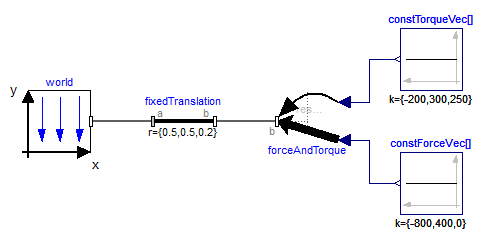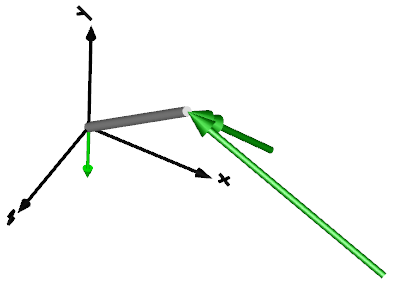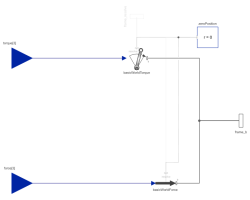WorldForceAndTorqueExternal force and torque acting at frame_b, defined by 3+3 input signals and resolved in frame world, frame_b or in frame_resolve |
|
Diagram
Information
This information is part of the Modelica Standard Library maintained by the Modelica Association.
The 3 signals of the force and torque connector are interpreted as the x-, y- and z-coordinates of a force and torque acting at the frame connector to which frame_b of this component is attached. Via parameter resolveInFrame it is defined, in which frame these coordinates shall be resolved:
| Types.ResolveInFrameB. | Meaning |
|---|---|
| world | Resolve input force and torque in world frame (= default) |
| frame_b | Resolve input force and torque in frame_b |
| frame_resolve | Resolve input force and torque in frame_resolve (frame_resolve must be connected) |
If resolveInFrame = Types.ResolveInFrameB.frame_resolve, the force and torque coordinates are with respect to the frame, that is connected to frame_resolve.
If force={100,0,0}, and for all parameters the default setting is used, then the interpretation is that a force of 100 N is acting along the positive x-axis of frame_b.
Conceptually, a force and torque acts on the world frame in such a way that the force and torque balance between world.frame_b and frame_b is fulfilled. For efficiency reasons, this reaction torque is, however, not computed.
The force and torque are by default visualized as an arrow (force) and as a double arrow (torque) acting at the connector to which they are connected. The diameters and colors of the arrows can be defined via variables forceDiameter, torqueDiameter, forceColor and torqueColor. The arrows point in the directions defined by the force and torque vectors. The lengths of the arrows are proportional to the length of the force and torque vectors, respectively, using parameters N_to_m and Nm_to_m as scaling factors. For example, if N_to_m = 100 N/m, then a force of 350 N is displayed as an arrow of length 3.5 m.
An example how to use this model is given in the following figure:

This leads to the following animation

Parameters (4)
| animation |
Value: true Type: Boolean Description: = true, if animation shall be enabled |
|---|---|
| resolveInFrame |
Value: Modelica.Mechanics.MultiBody.Types.ResolveInFrameB.world Type: ResolveInFrameB Description: Frame in which input force and torque are resolved (1: world, 2: frame_b, 3: frame_resolve) |
| N_to_m |
Value: world.defaultN_to_m Type: Real (N/m) Description: Force arrow scaling (length = force/N_to_m) |
| Nm_to_m |
Value: world.defaultNm_to_m Type: Real (N·m/m) Description: Torque arrow scaling (length = torque/Nm_to_m) |
Inputs (5)
| forceDiameter |
Default Value: world.defaultArrowDiameter Type: Diameter (m) Description: Diameter of force arrow |
|---|---|
| torqueDiameter |
Default Value: forceDiameter Type: Diameter (m) Description: Diameter of torque arrow |
| forceColor |
Default Value: Modelica.Mechanics.MultiBody.Types.Defaults.ForceColor Type: Color Description: Color of force arrow |
| torqueColor |
Default Value: Modelica.Mechanics.MultiBody.Types.Defaults.TorqueColor Type: Color Description: Color of torque arrow |
| specularCoefficient |
Default Value: world.defaultSpecularCoefficient Type: SpecularCoefficient Description: Reflection of ambient light (= 0: light is completely absorbed) |
Connectors (4)
| frame_b |
Type: Frame_b Description: Coordinate system fixed to the component with one cut-force and cut-torque |
|
|---|---|---|
| frame_resolve |
Type: Frame_resolve Description: The input signals are optionally resolved in this frame |
|
| force |
Type: RealInput[3] Description: x-, y-, z-coordinates of force resolved in frame defined by resolveInFrame |
|
| torque |
Type: RealInput[3] Description: x-, y-, z-coordinates of torque resolved in frame defined by resolveInFrame |
Components (6)
| world |
Type: World |
|
|---|---|---|
| forceArrow |
Type: Arrow |
|
| torqueArrow |
Type: DoubleArrow |
|
| basicWorldForce |
Type: BasicWorldForce |
|
| basicWorldTorque |
Type: BasicWorldTorque |
|
| zeroPosition |
Type: ZeroPosition |
